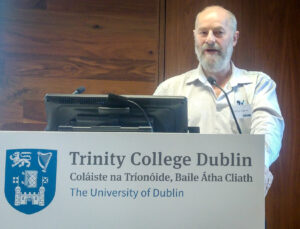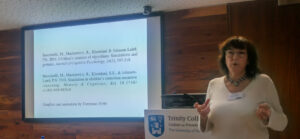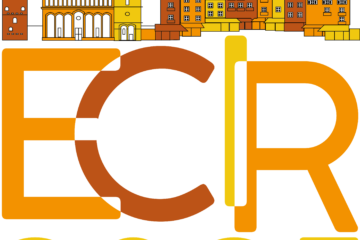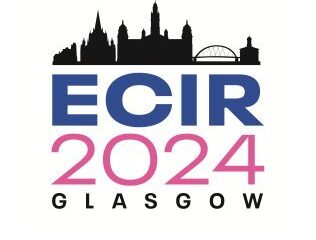The 26th AIAI Irish Conference on Artificial Intelligence and Cognitive Science (AICS) is over, and it was a full success. This year, AICS celebrated its 30th anniversary and was hosted by Trinity College Dublin’s School of Computer Science and Statistics, the School of Psychology and the Institute of Neuroscience. I had the honour to co-organize the conference together with Rob Brennan (General Co-Chair), Ruth Byrne (Cognitive Science Chair) and Jeremy Debattista (Publication Chair). AICS took place on the Trinity campus at the Trinity Long Room Hub, Trinity’s interdisciplinary arts and humanities research institute.
The following text is based on [3]. While once a niche area, the fields of Cognitive Science and Artificial Intelligence, which encompass Data Analytics, Information Retrieval, and Machine Learning, are now at the forefront of Irish computing research and industry. AICS is as alive as the general field of artificial intelligence these days and received almost double the number of submissions as last year. The packed programme contained 29 presentations and 12 posters (proceedings). The topics of the presentations and posters reflect the wide range of artificial intelligence and cognitive science research.
The Main Themes of AICS 2018
We are particularly delighted to have had two international keynote speakers, namely Torsten Schaub (University of Potsdam, Germany) and Monica Bucciarelli (University of Turin, Italy). Torsten Schaub addressed artificial intelligence solutions to solving knowledge-intense combinatorial problems. Monica Bucciarelli presented new cognitive science discoveries about how adults and children reason algorithmically. A leading computer scientist and a leading cognitive scientist, reflecting the balance of the conference.
The primary themes that emerged from the successful submissions to this year’s conference include AI and Cognitive Science research on numerical reasoning, reasoning applications, big data and machine learning, and speech processing, reflected in the conference thematic sessions.
Papers on the thematic session on numerical reasoning include AI developments in time-series classification discussed by Badiane et al., and Mahato et al.; as well as papers on algorithm selection by Collins et al., and on defeasible argumentation by Rizzo & Longo. Cognitive science advances in understanding mathematical skills and visuospatial mapping are considered by Morsanyi et al., and Cooney et al.
Papers on the theme of reasoning applications include AI applications to infectious disease epidemiology, traffic flow density, autonomous driving, and smart-home devices by Hunter et al., Saliba et al., Viswanath et al., and Furey & Blue. Cognitive science developments in understanding how people reason in the domain of moral judgments are presented by Parkinson & Byrne and by McHugh et al.
The Big Data theme focuses on AI developments in dealing with data in meetup networks, stock forecasting, bibliographic referencing, curriculum learning, and cloud servers, by Pakrashi et al., Shehin et al., Tkaczyk et al., Collier & Beel and Izima et al. Applications to cognitive functioning in multiple sclerosis patients are discussed by Kinski et al.
Further developments in understanding data are described in papers on traffic lights control, R2RML mappings, scholarly recommendations, and captioning by Carlo et al., Mathur et al., Beel et al., and Lindh et al.
The speech processing and reasoning session includes papers on AI advances in speech separation and speech quality monitoring by Ragano & Hines and by Jaiswal & Hines. Cognitive science advances in understanding narrative speech and joint speech are discussed by Broderick et al., and by Cummins. Sensor data and detecting adverts are considered in papers by Hossari et al., and Brophy et al. Cognitive processes in reasoning about scientific theories are discussed by Feeney & Travers.
AICS 2018 in Numbers
We received 55 submissions describing new research for AICS 2018, made up of 37 full papers and 18 student submissions. There was also a large number (14) of Nectar submissions giving an opportunity to spotlight the work of leading Irish-based researchers that has already been published in highly ranked international fora. The acceptance rate for full papers was 59% (22 accepted papers) and for student papers 67% (12 papers). The quality of submissions overall was very high, so that even submissions with relatively positive reviews had to be rejected. To accommodate as many presentations as possible, presentation slots were shortened this year from 20 to 15 minutes as it was not possible to secure additional space in the venue once the large number of submissions was known.
We are particularly delighted that a large number of Irish universities and companies, as well as international institutions, submitted their manuscripts to AICS. The list of Irish institutions includes:
- Bray Institute of Further Education (BIFE)
- Cork Institute of Technology (CIT)
- Dublin City University (DCU)
- Dublin Institute of Technology (DIT)
- Huawei Ireland
- Limerick Institute of Technology (LIT)
- Maynooth University (NUIM)
- National College of Ireland (NCI)
- National University of Ireland, Galway (NUIG)
- Queen’s University Belfast
- Trinity College Dublin (TCD)
- Ulster University (UU)
- University College Cork (UCC)
- University College Dublin (UCD)
- University of Limerick (UL)
- Valeo Vision Systems Ltd
Most of the AI submissions come from departments of computer science, and most of the cognitive science submissions come from departments of psychology or computer science. About three-quarters of the successful submissions are AI papers and about one-quarter are Cognitive Science papers.
The most full-paper submissions were made by the University College Dublin (22%), Trinity College Dublin (19%) and Dublin Institute of Technology (16%) (Table 1). The most student-paper submissions were made by the University College Dublin (22%), National University of Ireland, Galway (17%) and Trinity College Dublin (17%) (Table 2).
Table 1. Top-Institutions (Submitted Full Papers, n=37)
| Institute | Submissions (Absolute)[1] |
Submissions (Relative)2 |
| University College Dublin (UCD) | 8 | 22% |
| Trinity College Dublin (TCD) | 7 | 19% |
| Dublin Institute of Technology (DIT) | 6 | 16% |
| Ulster University (UU) | 3 | 8% |
| Dublin City University (DCU) | 2 | 5% |
| Others (15 Institutes) | 15 | 41% |
[1] A few submissions were made by authors from two institutions. In this case, we counted the submission twice. Hence, numbers do not add up to 100%.
Table 2. Top-Institutions (Submitted Student Papers, n=18)
| Institute | Submissions (Absolute)2 |
Submissions (Relative)2 |
| University College Dublin (UCD) | 4 | 22% |
| National University of Ireland, Galway (NUIG) | 3 | 17% |
| Trinity College Dublin (TCD) | 3 | 17% |
| University College Cork (UCC) | 2 | 11% |
| Others (7 Institutes) | 7 | 39% |
Acknowledgements
Sponsors & Supporters
The 26th Irish Conference on Artificial Intelligence and Cognitive Science is grateful for the support received by its sponsors Trinity College Dublin, Trinity Long Room Hub, ADAPT Centre, the StandICT.eu H2020 project and the French Embassy. We are further grateful for the help of Robbie Gallagher (ADAPT), Olivia Waters (ADAPT), Ademar Crotti (TCD), Jennifer Edmond (TCD), Emily Johnson (The Long Room Hub), Ciaran Conneely (Trinity Institute of Neuroscience), Brian Mac Namee (UCD, AIAI), John McAuley (DIT), Marc Daumas (French Embassy in Ireland) and Ailee Burke (O’Callaghan Collection). ADAPT is funded under the SFI Research Centres Programme (Grant 13/RC/2106) and co-funded by the European Regional Development Fund.


![]()
![]()
![]()
![]()
Program Committee & Reviewers
- Fred Cummins (University College Dublin)
- Susan McKeever (Dublin Institute of Technolgy)
- John McAuley (Dublin Institute of Technology)
- Derek Bridge (University College Cork)
- Ken Brown (University College Cork)
- Arthur Cater (University College Dublin)
- Sarah Jane Delany (Dublin Institute of Technology)
- Pierpaolo Dondio (Dublin Institute of Technology)
- Derek Greene (University College Dublin)
- Conor Hayes (National University of Ireland Galway)
- Georgiana Ifrim (University College Dublin)
- Gareth Jones (Dublin City University)
- Mark Keane (University College Dublin)
- Seamus Lawless (Trinity College Dublin)
- Luca Longo (Dublin Institute of Technology)
- Brian MacNamee (University College Dublin)
- Paul Mc Kevitt (Ulster University)
- Diarmuid O’Donoghue (National University of Ireland Maynooth)
- Colm O’Riordan (National University of Ireland Galway)
- Bianca Schoen Phelan (Dublin Institute of Technology)
- Alan Smeaton (Dublin City University)
- Carl Vogel (Trinity College Dublin)
- Aidan Feeney (Queens University Belfast)
- Fiona Newell (Trinity College Dublin)
- Mary Parkinson (University College Dublin)
- Suzanne Egan (University of Limerick)
- Tony Veale (University College Dublin)
- Fintan Costello (University College Dublin)
- Declan O’Sullivan (Trinity College Dublin)
- Jennifer Edmond (Trinity College Dublin)
- Bojan Bozic (Dublin Institute of Technology)
- Eoghan Furey (Letterkenny Institute of Technology)
- Christophe Debruyne (Trinity College Dublin)
- Annalina Caputo (Trinity College Dublin)
- Piyush Arora (Dublin City University)
- Rozenn Dahyot(Trinity College Dublin)
- Atif Qureshi (University College Dublin)
- Susan Leavy (University College Dublin)
- Kevin McGuinness (Dublin City University)
- Owen Corrigan (Trinity College Dublin)
- Feiyan Hu (Dublin City University)
- Yvette Graham (Dublin City University)
- Nic Wilison (University College Cork)
- Svetlana Hensman (Dublin Institute of Technology)
- Natalia Resende (Dublin City University)
- Luis Pechuan (University College Dublin)
- Quan Le (University College Dublin)
- Shen Wang (University College Dublin)
- Brian Davis (Maynooth University)
- Karla Munoz (University of Ulster)
- Alan Meehan (Trinity College Dublin)
- Lucy McKenna (Trinity College Dublin)
- Brendan Spillane (Trinity College Dublin)
- Peru Bhardwaj (Trinity College Dublin)
- Majid Latifi (Trinity College Dublin)
- Harshvardhan J Pandit (Trinity College Dublin)
References
[1] D. Lyons, “Artificial intelligence gets real,” Forbes MAgazine, 1998.
[2] A.A. Hopgood, “Artificial Intelligence: Hype or Reality?,” Computer, vol. 36, 2003, pp. 24–28.
[3] R. Brennan, J. Beel, R. Byrne, and J. Debattista, “Preface: The 26th AIAI Irish Conference on Artificial Intelligence and Cognitive Science (AICS 2018),” in Proceedings of the 26th Irish Conference on Artificial Intelligence and Cognitive Science (AICS), 2018, vol. 2259, pp. 1–7.











0 Comments